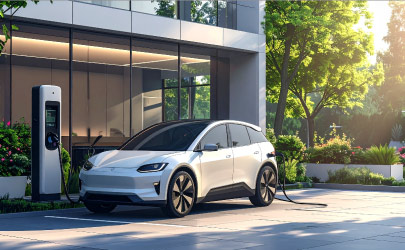Accelerating Sustainability: EV Composites Leading Europe’s Green Mobility

"The European EV composite market is experiencing significant growth, driven by the region’s aggressive push toward electric mobility and sustainability goals. Analysts note that the demand for lightweight materials like carbon fiber and glass fiber composites is soaring, as automakers strive to enhance vehicle efficiency and range. Europe's stringent emission regulations and commitments to phase out internal combustion engine vehicles by 2035 are accelerating the adoption of composites in electric vehicle production.
Carbon fiber composites are favored for high-performance EVs, while glass fiber composites offer a cost-effective solution for structural components. Additionally, the shift towards sustainable materials has sparked interest in natural fiber composites. The strong presence of major automotive manufacturers, coupled with government incentives for EV adoption, positions Europe as a key market for composite innovations. Analysts expect steady growth, particularly as technological advancements and recycling efforts make composite materials more accessible and environmentally friendly in the long run."
The Europe EV Composites market was valued at USD 0.270 Billion in 2023 and is projected to reach USD 0.76 Billion by 2030, with a compound annual growth rate (CAGR) of 15.2% from 2024 to 2030.
Major automotive hubs, particularly in Germany, the UK, and France, are making substantial investments in lightweight composite materials to improve EV efficiency and performance. The region also benefits from a strong supply chain, advanced manufacturing technologies, and robust R&D activities in composite materials such as carbon fiber and thermoplastics.
Furthermore, consumer demand for sustainable, eco-friendly vehicles is driving original equipment manufacturers (OEMs) to adopt innovative materials that reduce vehicle weight and enhance battery range. Europe's well-established EV infrastructure, along with growing support for electric mobility, creates a favorable environment for rapid market expansion, making it a key region in the global EV composites market.
Europe enforces strict CO2 emission standards, pushing automakers to adopt lightweight composites to improve EV efficiency.
Europe has some of the most strict emission standards globally, especially under the EU’s CO2 reduction goals for passenger cars and commercial vehicles. To meet these regulations, automakers are required to reduce the weight of electric vehicles (EVs) because lighter vehicles consume less energy, which improves fuel efficiency and lowers emissions. Lightweight composites, such as carbon fiber and glass fiber-reinforced plastics, are increasingly being used to replace traditional materials like steel and aluminum. This helps manufacturers meet emission targets without sacrificing performance or safety. These regulations are a major driver for composite materials in the region, ensuring that companies comply with EU legislation and avoid penalties.
Financial incentives and policies like the European Green Deal accelerate the shift to electric vehicles, boosting composite demand.
European governments are providing significant support for the transition to electric mobility through initiatives like the European Green Deal and national incentive programs. These initiatives offer tax breaks, purchase subsidies, and investments in EV infrastructure, creating a favorable business environment for both EV manufacturers and suppliers of composite materials. By 2030, the EU aims to have at least 30 million electric cars on the roads, which is driving manufacturers to seek out innovative, lightweight materials like composites to ensure EV efficiency. The combination of regulatory support and financial incentives creates a robust market for composites, as automakers must prioritize vehicle performance to meet policy demands.
Leading automakers in Europe, such as Volkswagen and BMW, invest heavily in EV production, driving the adoption of advanced composites.
Europe is home to some of the largest and most advanced automotive manufacturers globally, including Volkswagen, BMW, Daimler, and Stellantis. All of these companies are heavily investing in electric vehicle (EV) technology. They are at the forefront of EV development, utilizing cutting-edge materials to enhance vehicle performance and meet stringent emission standards. Advanced composites, such as carbon fiber-reinforced plastics, are essential to reducing vehicle weight and extending the range of electric vehicles. The region’s strong industrial base ensures that European automakers have access to the latest composite technologies and manufacturing processes, driving demand for high-performance materials that improve EV efficiency and sustainability.
Europe's strong R&D in composite materials, like carbon fiber, fosters innovation in lightweight, high-performance components for EVs.
Europe leads in research and development (R&D) for advanced materials, especially composite technologies. Institutions and companies in the region are actively involved in creating innovative composite materials such as carbon fiber and thermoplastic composites. These materials offer superior strength-to-weight ratios and are well-suited for electric vehicle components like battery enclosures and body panels. These advancements help reduce the overall weight of electric vehicles, improving battery efficiency and extending vehicle range. With continuous R&D in material science, Europe remains at the forefront of composite technology, providing automakers with new solutions to enhance the performance and sustainability of their electric vehicles.
Increasing demand for eco-friendly vehicles pushes automakers to use composites that enhance EV range and performance.
European consumers are increasingly turning to electric vehicles due to growing environmental concerns and government incentives. This increasing demand has pressured automakers to create efficient, high-performing EVs that meet customer expectations for longer driving ranges and better performance. To achieve these goals, manufacturers are using composite materials, which are lighter and stronger than traditional materials. This allows for improved battery efficiency and reduced vehicle weight. The demand for sustainable mobility is driving the use of composites in EV production as automakers aim to improve the energy efficiency and driving experience of electric vehicles.
Competitive Landscape
Some of the major companies operating within the EV Composites market are: Kautex Textron GmbH & Co. KG, Toray Industries, Inc., ElringKlinger AG, Exel Composites, Teijin Limited, Piran Advanced Composites, SGL Carbon, Syensqo, Mar-Bal, Inc., Plastic Omnium, Röchling SE & Co. KG, POLYTEC HOLDING AG, HRC (Hengrui Corporation), Envalior and Others.